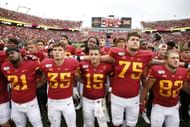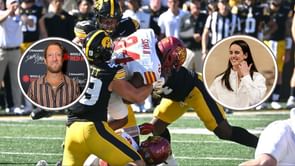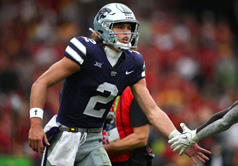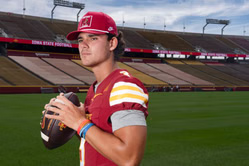Team Information
| Ground | Jack Trice Stadium |
| City | Ames, Iowa |
| Conference | Big 12, |
| Nickname | Cyclones |
Iowa State Cyclones Football Bio
The football program of the Iowa State Cyclones represents the intercollegiate football team affiliated with Iowa State University situated in Ames, Iowa. Currently, the team is under the guidance of coach Matt Campbell. Engaged in the competitive arena of the Big 12 Conference, the Cyclones proudly hold membership in the Division I Football Bowl Subdivision (FBS) governed by the NCAA. For their home fixtures, the Cyclones utilize Jack Trice Stadium, a venue capable of accommodating up to 61,500 spectators.

| Name of the team | Iowa State Cyclones |
| First Season | 1892 |
| Athletic Director | Jamie Pollard |
| Head Coach | Matt Campbell |
| Stadium | Jack Trice Stadium (capacity: 61,500) |
| Location | Ames, Iowa |
| Field Surface | Grass |
| Division | Division I FBS |
| Conference | Big 12 Conference |
| Claimed National Titles | None |
| Conference Titles | 2 (1911, 1912) |
| Fight Song | ISU Fights |
| Mascot | Cy the Cardinal |
| Rivals | Iowa (Cy-Hawk Trophy), Kansas State (rivalry), Missouri (rivalry) |
| Consensus All-Americans | 6 |
Iowa State Cyclones Football Introduction
The Iowa State Cyclones football program, based at Iowa State University in Ames, Iowa, has a storied legacy that dates back to its inception in 1892. Matt Campbell presently serves as the head coach of the Cyclones. Competing in the Big 12 Conference and operating within the NCAA's Division I Football Bowl Subdivision (FBS), the team plays its home games at Jack Trice Stadium, boasting a seating capacity of 61,500.
The early years of the Cyclones' football journey were marked by significant milestones and influential figures. Football initially emerged on the Iowa State campus in 1878 as a recreational pursuit, culminating in an organized representation of the university in football in 1892. Notably, college president William M. Beardshear laid the groundwork for an official athletic association to sanction Iowa State football teams in 1894, which yielded positive results with a notable victory against the University of Iowa.
Legendary coach Pop Warner's tenure during the team's nascent years left an indelible impact on Iowa State football. Under Warner's guidance, the team experienced both triumphs and challenges. The team's iconic victory over Northwestern in 1895 earned them the moniker "Cyclones," a name that has persisted through the years.
Subsequent eras saw notable coaches like Clyde Williams, who not only helmed the football team but also excelled in other sporting endeavors at Iowa State. Additionally, the team's history encompasses the tragic but significant tale of Jack Trice, the first African-American player at Iowa State, whose honor is immortalized by the renaming of Cyclone Stadium to Jack Trice Stadium.
Coaches like George F. Veenker, James J. Yeager, Mike Michalske, Abe Stuber, Vince DiFrancesca, and Clay Stapleton contributed to the team's legacy during the mid-20th century. Their coaching stints varied in success, marked by noteworthy victories, significant records, and periods of struggle for the Cyclones. Their combined efforts helped shape the team's trajectory, laying the foundation for the evolving history and prominence of Iowa State Cyclones Football.
Iowa State Cyclones Football History
The history of Iowa State Cyclones Football spans back to the late 19th century, marking its official initiation in 1892. Although football made its recreational debut in 1878, it wasn't until 1892 that an organized group of athletes represented Iowa State in football. In 1894, under the guidance of college president William M. Beardshear, an athletic association was formed, officially sanctioning Iowa State football teams. The early years saw the mentorship of legendary coach Pop Warner, who left an indelible mark on the team. Notably, Iowa State's team gained recognition as the Cyclones after a resounding victory over Northwestern in 1895, an epithet that endures to this day.
Throughout its early years, Iowa State witnessed several coaching luminaries. Clyde Williams, serving as head football coach from 1907 to 1912, achieved notable success, guiding the team to two Missouri Valley Conference football titles—the only conference championships in school history. Williams's multifaceted contributions extended beyond football, as he also served as the school's first men's basketball coach and athletic director.
The tragic loss of Jack Trice, Iowa State's pioneering African American player, in 1923 marked a poignant moment in the team's history. Trice's legacy was honored with the renaming of Cyclone Stadium to Jack Trice Stadium in 1997, a pioneering move making it the first major college football stadium named after a Black man.
Iowa State Football's history embodies a narrative of both triumphs and transitions. Under leaders like George F. Veenker and James J. Yeager, pivotal victories against formidable rivals like the Iowa Hawkeyes marked noteworthy milestones. Yet, subsequent coaching eras helmed by Mike Michalske, Abe Stuber, Vince DiFrancesca, and Clay Stapleton witnessed fluctuating fortunes. Paul Rhoads assumed leadership in 2008, orchestrating significant wins against tough opponents like Oklahoma State and Texas, ushering the Cyclones to bowl appearances. However, despite initial highs, a later decline in performance led to Rhoads' departure post-2015. This tapestry of achievements and changing trajectories underscores the diverse and impactful legacy of Iowa State's football journey.
Iowa State Cyclones Football Coach
Iowa State Cyclones Football has seen a lineage of 32 head coaches throughout its storied history. Currently at the helm stands Matthew Allen Campbell, widely known as Matt Campbell. Born on November 29, 1979, Campbell is an esteemed American college football coach who assumed the role of head football coach at Iowa State University in the 2016 season. Before leading the Cyclones, Campbell served as the head football coach at the University of Toledo from 2011 to 2015. His coaching journey began as an assistant at several institutions, including Toledo, Bowling Green, and Mount Union. Hailing from Ohio, Campbell initially attended the University of Pittsburgh before transitioning to Mount Union, where he showcased his skills as a defensive lineman. His leadership, strategic prowess, and dedication to elevating Iowa State's football program have solidified his position as a respected figure in college football coaching circles.
| Coach | Tenure |
| Ira C. Brownlie | 1892 |
| W. F. Finney | 1893 |
| Bert German | 1894 |
| Pop Warner | 1895–1899 |
| Joe Meyers | 1899 |
| C. E. Woodruff | 1900 |
| Edgar Clinton | 1901 |
| A. W. Ristine | 1902–1906 |
| Clyde Williams | 1907–1912 |
| Homer C. Hubbard | 1913–1914 |
| Charles Mayser | 1915–1919 |
| Norman C. Paine | 1920 |
| Maury Kent | 1921 |
| Sam F. Willaman | 1922–1925 |
| Noel Workman | 1926–1930 |
| George Veenker | 1931–1936 |
| James Yeager | 1937–1940 |
| Ray Donels | 1941–1942 |
| Mike Michalske | 1942–1946 |
| Abe Stuber | 1947–1953 |
| Vince DiFrancesca | 1954–1956 |
| Jim Myers | 1957 |
| Clay Stapleton | 1958–1967 |
| John Majors | 1968–1972 |
| Earle Bruce | 1973–1978 |
| Donnie Duncan | 1979–1982 |
| Jim Criner | 1983–1986 |
| Chuck Banker | 1986 |
| Jim Walden | 1987–1994 |
| Dan McCarney | 1995–2006 |
| Gene Chizik | 2007–2008 |
| Paul Rhoads | 2009–2015 |
| Matt Campbell | 2016–present |
Iowa State Cyclones Football Stadium: Jack Trice Stadium
Jack Trice Stadium, situated in Ames, Iowa, stands as a poignant tribute as the first major college stadium named after a Black man. Named in honor of Jack Trice, Iowa State's inaugural African American athlete, the stadium opened its doors on September 20, 1975, witnessing a victorious inaugural game against Air Force. Initially known as Cyclone Stadium, the venue was later renamed Jack Trice Field and is sometimes referred to as "the Jack."
With an official seating capacity of 61,500, which includes hillside seats in the stadium's corners, Jack Trice Stadium holds the third-largest capacity within the Big 12 Conference, trailing only behind Darrell K. Royal — Texas Memorial Stadium and Gaylord Family Oklahoma Memorial Stadium. Notably, the stadium's current record for single-game attendance, reaching the full capacity, was achieved during the Cyclones' triumph over the University of Northern Iowa on September 5, 2015.
The evolution of Jack Trice Stadium has been a transformative journey, initially offering a capacity of 42,500 and later expanding to accommodate 61,500 spectators. Through generous donations and the support of the Iowa Board of Regents, significant enhancements, including the south end-zone addition, amplified its capacity. Continuous upgrades, notably the Bergstrom football complex, a $20.6 million state-of-the-art training facility, further underscore the commitment to improving infrastructure. Plans outlined by Paul Rhoads highlight ongoing efforts to enhance amenities for players and spectators. As a pivotal element within the expansive Iowa State Center, the stadium epitomizes progress and honor, extending its significance beyond football in the collegiate athletic landscape.
Iowa State Cyclones Football Rivals
The Iowa State Cyclones Football team boasts enduring rivalries that have shaped the essence of their seasons throughout history. Their primary rivalry lies with the Iowa Hawkeyes, a storied contest known as the Cy-Hawk Trophy, which commenced in 1894 and continued sporadically until its official revival in 1977. The series encountered interruptions, notably in 1934 due to scheduling conflicts and, more recently, in 2020 amid the COVID-19 pandemic. Iowa holds the series lead at 46–23 through 2022, with games split between Iowa City and Ames. Another significant rival, Kansas State, has engaged in intense clashes since 1917 within the Big Eight and Big 12 Conferences, marked by alternating winning streaks and closely contested battles. Iowa State narrowly leads this matchup at 52–50–4. The rivalry with Missouri, born in 1896, had an incident in 1959 involving phone lines that led to the creation of the Telephone Trophy. However, Missouri's departure to the SEC ultimately halted the rivalry, leaving Missouri with the lead in the series at 61–34–9. These rivalries continue to infuse the Cyclones' football legacy with competitive fervor and historical significance.
Iowa State Cyclones Football Record and stats
Conference championships
| Year | Conference | Coach | Overall record | Conference record |
| 1911† | MVIAA | Clyde Williams | 6–1–1 | 2–0–1 |
| 1912† | 6–2 | 2–0 |
Division championships
| Year | Division | Coach | Overall record | Conference record | Opponent | CG result |
| 2004† | Big 12 North | Dan McCarney | 7–5 | 4–4 | N/A lost tie-breaker to Colorado |
Iowa State Cyclones Football Roster
The Iowa State Cyclones Football team showcases a diverse roster across offense and defense, bringing together a talented array of players from various classes and hometowns. On the offensive side, Rocco Becht (QB), Blaze Doxzon (RB), and Cartevious Norton (RB) contribute their skills alongside emerging talents like Carson Hansen (RB) and Arlen Harris Jr. (RB). Defensively, a formidable lineup includes Jefferson Adam (DE), Anthony Cunningham Jr. (DE), and Tobechi Okoli (DE), supported by rising stars such as Chet Andrews (DE) and Vince Benetti (DE). The team's depth spans from experienced seniors like Levi Hummel (RB) to promising freshmen like JJ Kohl (QB) and Easton Miller (RB), demonstrating a blend of skill, potential, and diversity within the Cyclones' roster for the season.
Iowa State Cyclones Football Schedule
The Iowa State Cyclones Football team endured a challenging yet eventful regular season, showcasing prowess with seven wins and facing adversity with five losses. Victories were claimed against Northern Iowa (W30-9), Oklahoma State (W34-27), TCU (W27-14), Cincinnati (W30-10), Baylor (W30-18), BYU (W45-13), and Kansas State (W42-35). However, they encountered setbacks against Iowa (L20-13), Ohio (L10-7), Oklahoma (L50-20), Kansas (L28-21), and Texas (L26-16). The team's journey throughout the season highlighted notable performances from key players like Becht, Sama III, Sanders, and Noel, contributing significantly to their wins and shaping their competitive edge in the matches played.
FAQs
Jack Trice Stadium stands as a symbolic tribute, named after Iowa State's first African-American athlete. Its capacity of 61,500 makes it an iconic venue for Cyclones' home games.
Iowa State engages in historic rivalries with Iowa (Cy-Hawk Trophy), Kansas State, and Missouri. These contests have shaped the team's competitive history over the years.
Matt Campbell serves as the head coach. He transitioned from coaching roles at Toledo and has significantly elevated the team since joining in 2016.
The team's legacy includes achievements like two conference titles in 1911 and 1912 and the tragic yet significant tale of Jack Trice, the first African-American player at Iowa State.
The Cyclones faced tough matches against Iowa, Ohio, Oklahoma, Kansas, and Texas, resulting in pivotal moments that tested the team's resilience throughout the season.




